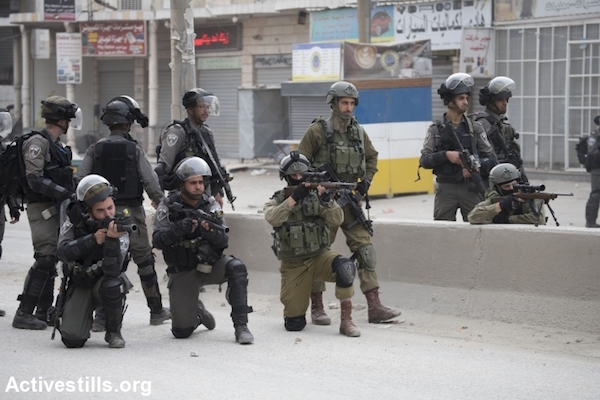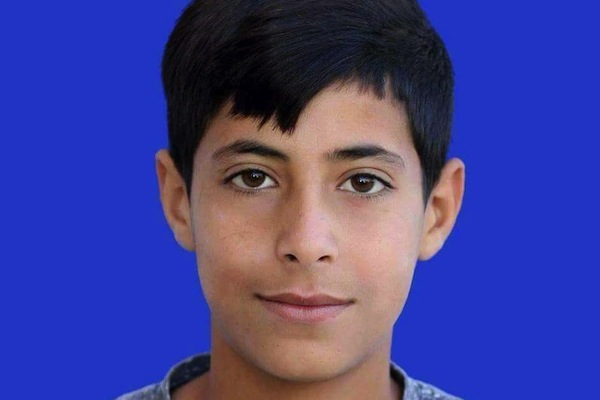The Israeli army shot and killed five unarmed Palestinians in January, all of whom were shot in the upper body, none of whom posed a danger to the soldiers.

The Israeli army shot and killed five unarmed Palestinians last month, all of whom were shot in the upper body during clashes and demonstrations in the West Bank and Gaza, according to Israeli anti-occupation organization B’Tselem. None of them posed a danger to the soldiers when they were killed, says the organization.
The first killing took place on January 3rd, when Israeli soldiers reportedly shot Mus’ab a-Sufi, 16, in the neck from a distance of 200 ft., during clashes between Israeli forces and Palestinian youth outside the village of Deir Nidham, northwest of Ramallah. N.S., who witnessed the killing, provided the following testimony:
At around 1:00 p.m., I heard cries of warning from Umm Khaldun’s balcony: ‘Watch out, the soldier is aiming at you.’ Every time I saw a soldier aiming his weapon at us, we hid behind a wall, or a tree or a rock. At that point, Mus’ab was sitting by the side of the road to my right. He said to me: ‘I want to move forward, cover me.’ I don’t know if he meant to throw a stone or just hide somewhere else. He got up and moved forward a few meters. He wasn’t holding anything at the time, not even stones. One of the soldiers, I can’t remember which one, pointed his weapon at Mus’ab. His brother and I both warned him: ‘Hide, hide, he’s aiming at you,’ but he didn’t listen. Mus’ab kept going forward, and then one of the soldiers fired a live round at him and hit his neck. Mus’ab fell to the ground and started groaning. I went up to him and saw he was bleeding heavily from the left side of the neck.
The next day, during clashes following a-Sufi’s funeral, B’Tselem says soldiers shot Muhammad Awad, 19, in the head from a distance of 70 ft. He was diagnosed with a fractured cranium and metal shrapnel lodged in his head, and remains hospitalized.
On January 11, following the killing of Rabbi Raziel Shevach outside a West Bank outpost two days earlier, soldiers set up a checkpoint on the road near the village of Iraq Burin, close to Nablus. Clashes erupted and lasted until 5 p.m. At around 4:30 p.m., Palestinian youth reportedly began throwing rocks as two military jeeps drove from the village of Burin toward Iraq Burin. According to B’Tselem, the first jeep continued driving toward the village, while the second one stopped about 100 ft. away from the youths. Demonstrators say a soldier opened fire from inside the jeep, hitting Ali Qinu, 17, in the head and killing him. A.Q. described what happened:
A soldier who was sitting in the jeep fired two or three shots in our direction. Then he fired more than 20 consecutive shots. We all ran away from the fire, and then the jeep started driving towards the village again. After the jeeps got further away, we checked that everyone was okay. We didn’t see Ali. We called out to him and looked for him. We went back to where we had been before and found him lying face down. His head was split open and he was bleeding. Another guy and I turned him over. His face was pale and there was no sign of life. He wasn’t breathing. I put my hand on his neck and there was no pulse.
That same day, during a demonstration near the fence between Israel and Gaza, soldiers reportedly shot Amir Abu Masa’ed in the armpit from a distance of 50 to 70 meters away, killing him. Four days later, soldiers shot and killed Ahmad Slim, 28, during clashes along the separation wall near Qalqiliya.
On January 30, Layth Abu Na’im, 16, was killed while reportedly hiding between pillars in a yard at the center of the village of al-Mughayir. Abu Na’im had been part of a group of Palestinians who were throwing stones at a nearby road. IDF soldiers chased them back into the village. A.M., a married father of six who owns a nearby store, saw the killing:
The youth – I didn’t know his name – tried to hide or throw a stone, but I couldn’t see any stone thrown. A jeep was parked about 20 meters away. I heard a shot and saw the youth fall straight to the ground and stop moving. A soldier immediately got out of the jeep, and then several other soldiers got out to see what was going on in the area. They looked all around and at the roofs, their guns ready. The soldier who got out first came over to me together with another soldier, pointed his weapon at me and ordered me to go inside the store. They went up to the youth who had been shot, looked at him closely and then left him there. They hurried back to the jeep and left.
Physicians at the hospital in Ramallah pronounced Abu Na’im dead, stating “that he had been killed by a rubber-coated metal bullet that had penetrated his skull through his face.”

The Israeli army’s open-fire regulations stipulate that the use of live fire is permitted in only two circumstances: when soldiers and other individuals are in mortal danger and when there is no other way to avert the danger, or when opening fire at a person’s legs is the last phase in an attempt to arrest that person, only after they have given warning and fired in the air.
According to B’Tselem, the army’s conduct did not meet the conditions under which shooting to kill is permitted. The organization stated that the IDF’s conduct “renders the open-fire regulations, which are supposed to limit the use of lethal firepower, devoid of meaning and convey deep disregard for the lives of Palestinians.”

